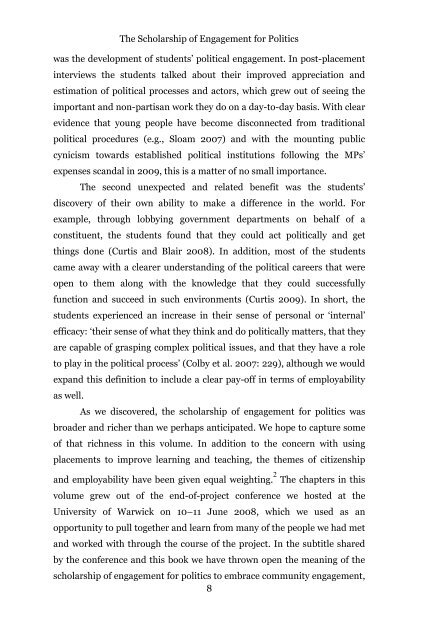The Scholarship of Engagement for Politics: - Higher Education ...
The Scholarship of Engagement for Politics: - Higher Education ...
The Scholarship of Engagement for Politics: - Higher Education ...
Create successful ePaper yourself
Turn your PDF publications into a flip-book with our unique Google optimized e-Paper software.
<strong>The</strong> <strong>Scholarship</strong> <strong>of</strong> <strong>Engagement</strong> <strong>for</strong> <strong>Politics</strong><br />
was the development <strong>of</strong> students’ political engagement. In post-placement<br />
interviews the students talked about their improved appreciation and<br />
estimation <strong>of</strong> political processes and actors, which grew out <strong>of</strong> seeing the<br />
important and non-partisan work they do on a day-to-day basis. With clear<br />
evidence that young people have become disconnected from traditional<br />
political procedures (e.g., Sloam 2007) and with the mounting public<br />
cynicism towards established political institutions following the MPs’<br />
expenses scandal in 2009, this is a matter <strong>of</strong> no small importance.<br />
<strong>The</strong> second unexpected and related benefit was the students’<br />
discovery <strong>of</strong> their own ability to make a difference in the world. For<br />
example, through lobbying government departments on behalf <strong>of</strong> a<br />
constituent, the students found that they could act politically and get<br />
things done (Curtis and Blair 2008). In addition, most <strong>of</strong> the students<br />
came away with a clearer understanding <strong>of</strong> the political careers that were<br />
open to them along with the knowledge that they could successfully<br />
function and succeed in such environments (Curtis 2009). In short, the<br />
students experienced an increase in their sense <strong>of</strong> personal or ‘internal’<br />
efficacy: ‘their sense <strong>of</strong> what they think and do politically matters, that they<br />
are capable <strong>of</strong> grasping complex political issues, and that they have a role<br />
to play in the political process’ (Colby et al. 2007: 229), although we would<br />
expand this definition to include a clear pay-<strong>of</strong>f in terms <strong>of</strong> employability<br />
as well.<br />
As we discovered, the scholarship <strong>of</strong> engagement <strong>for</strong> politics was<br />
broader and richer than we perhaps anticipated. We hope to capture some<br />
<strong>of</strong> that richness in this volume. In addition to the concern with using<br />
placements to improve learning and teaching, the themes <strong>of</strong> citizenship<br />
and employability have been given equal weighting. 2 <strong>The</strong> chapters in this<br />
volume grew out <strong>of</strong> the end-<strong>of</strong>-project conference we hosted at the<br />
University <strong>of</strong> Warwick on 10–11 June 2008, which we used as an<br />
opportunity to pull together and learn from many <strong>of</strong> the people we had met<br />
and worked with through the course <strong>of</strong> the project. In the subtitle shared<br />
by the conference and this book we have thrown open the meaning <strong>of</strong> the<br />
scholarship <strong>of</strong> engagement <strong>for</strong> politics to embrace community engagement,<br />
8
















